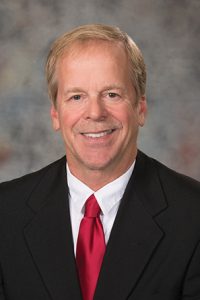Cap on school district property tax increases proposed
The Revenue Committee heard testimony Feb. 1 on a bill that would limit annual increases in the amount of property taxes collected by Nebraska public school districts.

Under LB589, introduced by Albion Sen. Tom Briese at the request of Gov. Jim Pillen, a district’s property tax request — the amount of taxes requested to be raised through its levy — could not exceed its property tax request authority, which the state Department of Education would calculate annually.
Briese said Pillen has pledged to direct additional state funding to public schools in an effort to reduce the state’s overreliance on property taxes to fund education. LB589 and the accompanying funding bills, one of which would provide per-student foundation aid to school districts, are a “package deal,” he said.
“If we’re going to put more … state dollars into education,” Briese said, “we have an obligation to ensure those dollars yield relief for our taxpayers.”
Under LB589 as introduced, a district’s property tax request authority would be calculated using a base growth percentage of 3 percent or by a percentage based on the district’s growth in student enrollment, the number of limited English proficiency students or the number of students in poverty, whichever is highest.
Briese said he would introduce an amendment under which the calculation instead would use a base growth percentage that is the sum of 3 percent and percentages based on those other factors.
The bill’s provisions would not apply to the portion of a district’s property tax request needed to pay the principal and interest on approved bonds, and a district could carry forward unused property tax request authority to future years.
A district’s property tax request could exceed its property tax request authority by an amount approved by a 60 percent majority of legal voters at a special election.
As introduced, LB589 also would allow a school board to exceed a district’s property tax request authority by 4 to 7 percent, depending on the number of students enrolled, if at least 75 percent of its members approve.
Under his amendment, Briese said, an override instead would require approval by at least 70 percent of a board’s members.
Pillen testified in support of the proposal, saying it would set a “workable” cap on school revenue growth that respects local control while ensuring that the proposed increase in state K-12 funding results in property tax relief.
Bruce Rieker testified in support of LB589 on behalf of the Nebraska Farm Bureau and seven other organizations representing the state’s agricultural and ethanol industries. LB589 would give school districts the latitude to respond to changing economic conditions while protecting local control, Rieker said.
Connie Knoche testified in opposition to the bill on behalf of OpenSky Policy Institute. She said LB589 would limit growth in a school district’s property tax asking by an arbitrary amount unrelated to its needs.
Omaha Public Schools superintendent Cheryl Logan also testified in opposition, saying property taxes historically have been a more stable school funding source than state aid. Logan said the proposed cap would make it more difficult for locally elected school boards to set budgets during times of high inflation, absorb increasing vendor costs and increase pay for teachers in a competitive labor market.
Liz Standish testified in a neutral capacity on behalf of Lincoln Public Schools. LPS opposes LB589 as introduced, she said, but the adoption of Briese’s amendment would help address school board members’ concerns.
Even with the proposed changes, however, LB589 would not give LPS enough flexibility to keep up with inflation or raise pay in order to attract and retain teachers, Standish said.
The committee took no immediate action on the bill.

